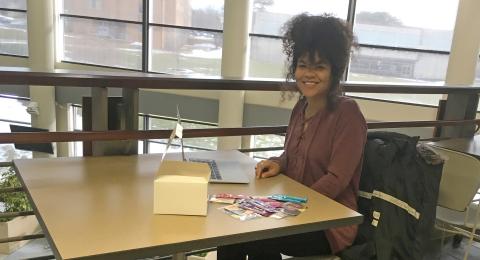Quest presentation to examine local teen pregnancy rates, awareness
Office of Communications and Marketing
Published
SUNY Oswego student MacKenzie Grow’s research into high local teenage pregnancy rates and awareness of resources will be among the topics explored at the college’s Quest on April 4.
Quest, the college’s annual daylong celebration of student, faculty and staff scholarly and creative activity, invites the campus and community to attend free panels, presentations, readings, a poster session and more.
The gender and women's studies major and health studies minor from Fulton is looking at why, between 2011 and 2013, 41.4 percent of all pregnancies in Oswego County were teenagers -- almost double the nation’s average.
The two-year project fulfills Grow's graduation requirement both in the college’s Honors Program and as the gender and women's studies’ capstone -- but moreover comes from Grow’s desire to take action.
By relaying her findings, Grow hopes to amplify effective outreach in the community and “make pregnancy more healthy, more informed and a more planned, conscious decision in this area,” she said.
Grow designed this study herself and was able to work independently on the project, gaining firsthand community outreach experience. With the help of a campus Scholarly and Creative Activities Grant and the guidance of her mentor, Joanna Goplen, she was able to gain insight into the community and this pressing issue.
She worked with community organizations like Oswego County Opportunities (OCO), which enabled her to gain even more in-depth knowledge through sitting in on some of their programs.
Her experiment involved distributing a variety of surveys, one set designated to a control group and the other to an experimental group. Grow collected data by addressing people at local places such as a farmers’ market, the Fulton Wal-Mart, substance abuse counseling meetings and women’s groups. The first survey was more awareness-based and the second was intention-oriented.
The awareness-based survey focused on whether the control group participants knew of specific health care centers in the area and whether they utilize or have utilized these places. The respondents then received a resource sheet of county health care clinics and what they can do for those in need. After that, the participants took another survey analyzing their intentions on using these once they knew they existed and what they offered.
For the experimental group, a care package was distributed between the same two surveys. The package included materials that would aid in increasing sexual health and contraception, and even provided bus passes that would enable transportation, if needed. Grow hopes to prove that the experimental group, those receiving the care package, will be more inspired to take action.
“I want the discussion to be easier; I want people to feel these resources are for them,” said Grow. “OCO does a really good job working with people on a sliding scale. Whether they are uninsured or underinsured, they will work with you.”
Grow was accepted into UCLA’s master’s in public health program and is looking forward to continuing her research on related topics.
For more information on Quest, including an upcoming schedule, visit oswego.edu/quest.



